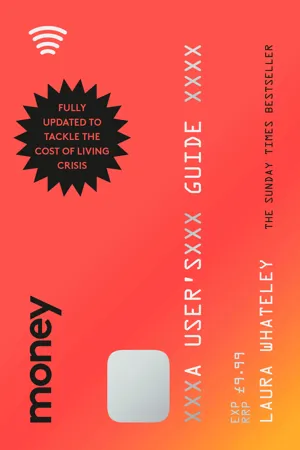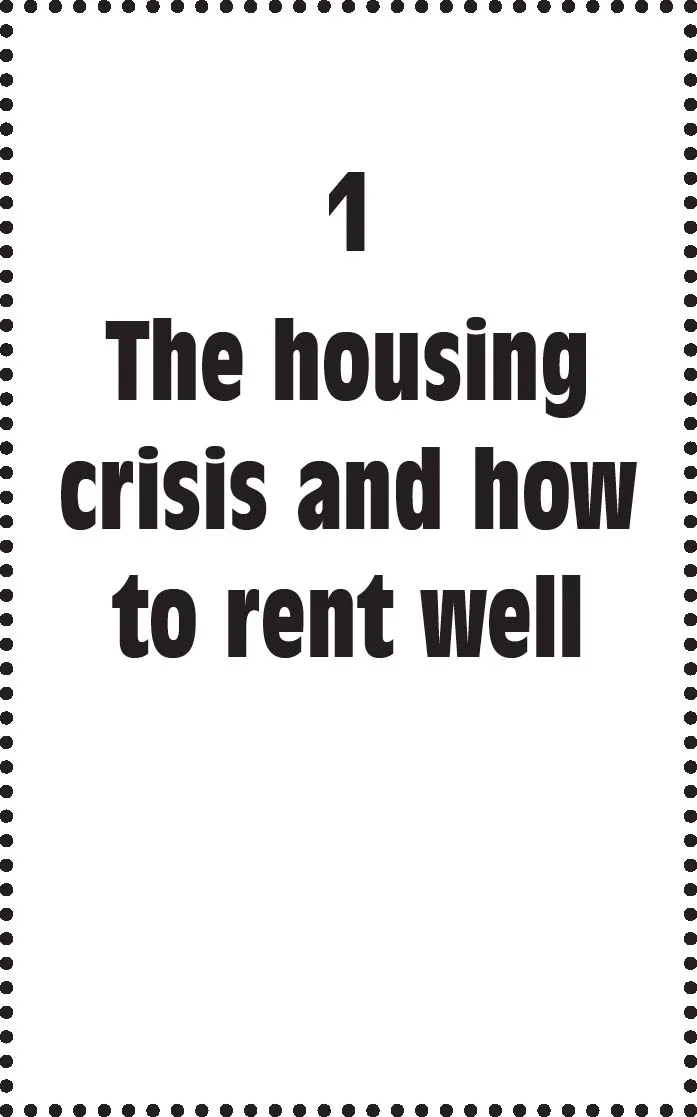Where better to start than with the generation-defining money issue for anyone under forty: where the hell can we afford to live? If arctic rolls and the threat of nuclear war shaped those that came of age in the Seventies, so the Noughties kids have had the Spice Girls, MSN Messenger and a housing crisis.
In November 2017 the estate agent Strutt & Parker (which sells what I would consider to be largely unaffordable properties: a £525,000 cottage in a hamlet outside Totnes, Devon; a £25 million house in Notting Hill, London) issued a report that blew up on Twitter about how first-time buyer couples should be able to save the average £33,000 needed for a UK house deposit, or the insane £64,000 needed for a London house deposit, within just five years by cutting down on six ‘luxuries’.
Some of the numbers: give up one night out a week and save £6,000 annually (that assumes you spend £115 a week on one night out) and £2,640 a year on takeaways (£50 a week!). Make rather than buy sandwiches for another £2,576 (£49.50 a week, but you should still eat lunch over the next five years, and bread is not normally free) and eliminate £832 a year on lottery tickets (£16 a week. Anyone?).
Even after finding that, having given up excessive expenditure that you are unlikely to be making, you are still short if buying in London, here comes the kicker:
‘Those lucky enough to have family that can help will receive an [additional] average of £29,400 towards their goal.’
Whichever way you want to spin it, however much money you think us under-thirty-fives are wasting on Deliveroo, the statistics are tough to argue away. Average house prices have far outstripped average earnings across the UK, which makes it way more expensive than it used to be to buy a house in every part of the country.
In the South East, where, still, many of the most prestigious and lucrative graduate jobs are to be found, it is particularly bad, with London house prices 15.7 times higher than average incomes for people between the ages of twenty-five and thirty-four, according to a report from February 2018 by the think tank the Institute for Fiscal Studies (IFS). Across Great Britain as a whole nearly 40 per cent of twenty-five to thirty-five year olds face a house price to income ratio of at least 10.
A separate report by the Office of National Statistics (ONS) found that in 2017 the price of a home in London was 13 times the wages of full-time workers aged twenty-two to twenty-nine, in 1999 it was 3.9 times the then average salaries. Even in the North East they are 5.5 times, up from 2.46 in 1999.
Bear in mind, as outlined in chapter 2, my guide to whether or not you can afford to buy, you are unlikely to be able to borrow more than four or five times your salary in a mortgage.
Whenever such statistics appear in the press there follows the same reductive, crabby response: ‘Whilst house ownership has collapsed the stag/hen do market in Marbella or Prague has soared,’ one man wrote on thetimes.co.uk. But there was another comment on the coverage of the IFS report that sums it up for me, from someone who says she bought a modest semi in the South East in the 1970s.
FYI, if you went on fifty-two lavish £500 stag or hen dos (sympathies), one every weekend for a whole year, you would have spent £26,000. A typical 20 per cent house deposit in London is now more than £80,000, according to Nationwide Building Society.
With that in mind it makes sense to start any advice on housing with some tips on how to rent well. A third of those born between 1981 and 2000 will be tenants for the rest of their lives, according to the think tank the Resolution Foundation.
I will then move on in chapter 2 to help you work out whether or not you can afford to buy a home, and if you can, how to sort out your credit score, and get yourself the best mortgage possible.
The majority of perma-tenants will be so because they cannot raise a housing deposit big enough to buy close to where they work. I think it is worth stressing, though, that for some people renting is not a result of being unable to buy, but a positive lifestyle decision and a better way of spending, or saving, their salary.
The rental market is riddled with problems, shyster letting agents and landlords promoting property that is not fit for human habitation. Moving constantly between rental properties can be horrendous, as is not knowing when you are going to be booted out or when your rent is going to be raised. Such uncertainty is damaging to mental and physical health, children’s schooling, general morale, your confused cat and your wilting pot plants. All the same, for some tenants spending income on rent offers a better, more flexible, sociable way of existing than tying themselves to a hefty mortgage and a resulting nine-to-five grind for the rest of their days. Maybe you don’t want to carry the responsibility of fixing a leaking roof.
So: you are renting, out of necessity or out of choice. How do you make the best of it?
When renting privately you will either do so direct from a landlord or through a letting agency. There are pros and cons of each. Going direct to a landlord helps keep fees down, and you may not have to submit to a credit check. Rents can be cheaper because landlords are not paying someone else to find and check tenants for them. I am also convinced that letting agents play a large part in encouraging landlords to raise rents. Cut out the middleman and you may charm your landlord into wanting to hang on to you without charging more. Reliable tenants are assets.
Sites such as Open Rent, HOWSY and Homerenter match up tenants and landlords direct, though you may have to pay some low fees if a landlord wants to see a reference.
Going through a letting agent might help if you need repairs doing, when the agent can negotiate with your landlord on your behalf. You also have more consumer protection by signing up to rent through a letting agency. Agents must be part of a redress scheme, such as the Property Ombudsman (TPO) or The Property Redress Scheme. You can turn to these organizations for help with any disputes you may have with your landlord or agent. Check an agent’s membership before you commit.
The massive downside to letting agents always used to be their rip-off fees, charging for whatever they could get away with: ‘admin’, ‘renewal’, ‘referencing’. Mercifully, since the first edition of this book was published, the majority of tenant fees have been banned under a law that came in on 1 June 2019.
Agents can now charge only for rent, a refundable holding deposit and security deposit, and a select few ‘default’ fees, including for late payment of rent by more than 14 days and if you lose your keys. This default fee loophole was closed because of fears, as I wrote in the first edition of this book, that agents would charge for unreasonable defaults like, as housing charity Shelter has seen, £3 per skirting board for failing to remove dust, and £45 for a replacement dustpan and brush. This is no longer allowed, so if you are in this situation, challenge it.
When you have found a property you want to rent you will generally need to go through a credit-check process (if you are worried about your credit history see chapter 2 on how to improve it), which is where you are rated on how likely you are to pay your rent on time. You may also need to show bank statements and provide references, such as your old landlord or employer, or failing that, to offer a guarantor, such as a parent, who will agree to cover your rent if you cannot meet it. You then have to cough up a lot of money for a deposit.
Some agents or landlords require a holding deposit, which is a sum of rent paid to secure the property you want while the letting agent checks your references. This can be no more than a week’s rent. Do not pay until you are sure you want the property, because you may not be able to get this deposit back if you don’t. Usually it will be taken off your tenancy deposit. Get the holding-deposit details in writing, including what will happen to it if your landlord changes their mind and you can’t move in.
You usually also have to pay your first month’s rent in advance. You then need to add on the tenancy deposit. Since June 2019, tenancy deposits are capped at five weeks’ rent if your total annual rent is less than £50,000, or six weeks at £50,000 or above.
Always get receipts whenever you pay anything, in case there are any issues further down the line. Before you pay or sign, see if you can negotiate the cost of the rent. These things are not fixed and agents or landlords may be trying it on.
You also need to ask a few questions: how and when you will be paying rent, and whether the rent includes any bills; how long you can rent for – the length of your tenancy – and whether you are entitled to end it early. Are there any rules on what you can and can’t do in the flat – for example, have parties, keep a dog, smoke?
Ask to see the property’s Energy Performance Certificate (EPC). Legally a property you rent must have an energy-efficiency rating of at least E, unless it is exempt, in which case there is a register for exempt properties on gov.uk. If the property is an F or G your landlord is breaking the law and can be fined.
If you are moving into a shared house with several flatmates your home should be licensed with the local council as a house in multiple occupation (HMO) to make sure it is safe and not at risk of overcrowding. This is worth checking.
Also, it may sound obvious, but do actually view the property you want to rent in situ, rather than just online, before parting with any cash. There are lots of online rental scams out there, particularly targeting students, where you pay upfront fees to secure properties that either do not actually exist or have already been rented out, sometimes multiple times.
Most private renters will sign an assured shorthold tenancy. Have a good read of the tenancy agreement before you sign it, which lays out what responsibilities your landlord has and how to end or renew your tenancy. Make sure you are given a written tenancy agreement, one in five millennial renters told consumer group Which? that they did not get one when moving. Most shorthold tenancies last six or twelve months, and you have to pay the agreed rent for this whole period. After this fixed period you can agree a new contract, or allow the tenancy to continue. If you want to leave at the end of the fixed term you probably need to give written notice in advance; your agreement should tell you how much notice you need to give. A landlord can end your tenancy without reason – outside of the fixed period – but needs to give you written notice. Until at least March 2021 – extended to help those affected by the impact of coronavirus – this has to be six months, under a law known as section 21, and provided that your leaving date falls at least six months after your original tenancy began. The government has pledged to ban these section 21 no-fault evictions, making renting more secure, but it is not clear yet when this will make it into law.
If you are living with other people you may sign a joint tenancy agreement. This means that you are all responsible for rent, and for sticking to the terms of your agreement. If your flatmate moves out and refuses to pay rent, you will be lumbered with it instead, so pick your roomies carefully.
Landlords have to keep your deposit safe by putting it into a deposit-protection scheme within thirty days of you paying it, or will ask a letting agent to protect your deposit for them. The deposit has to be in a government scheme, and your landlord needs to tell you which one. There are three: Deposit Protection Service (DPS), Tenancy Deposit Scheme (TDS) and My Deposits. They are also allowed to use an insurance scheme to protect it, instead.
You may be given a ‘repayment ID’ from the scheme. Keep it safe: you need it to get your deposit back at the end of your tenancy.
Landlords can only deduct money from your deposit for damage, cleaning costs if you have left the place in a worse state than when you moved in, and any missing items. Their right to do this needs to be detailed in your tenancy agreement. They cannot deduct money for normal wear and tear – for example, scuffs on the walls or faded carpets. Damage needs to be things like a massive iron burn in the middle of the floor.
Check your agreement to see whether you are supposed to have the property professionally cleaned before you move out.
You will agree an inventory when you first move in: a document detailing what is in the property and its condition. Take lots of photos, inside and out, to make a record of any existing issues. You might also want to take photos of the property to show what it is like as you move out, and do a check-out inventory, getting your landlord to sign it, as your back-up if there is any dispute.
You have to contact your landlord or letting agent to request your deposit back. Best do it by email or in writing, so that you have evidence of the date. You should get it back within ten days. If they refuse, or take longer, or if you don’t agree with any deductions they make, you can contact the deposit-protection scheme where your money is kept and go through their free dispute-resolution process. If your landlord has made any deductions they should write to you to explain how much and why.
Shelter has a useful template letter on its site to help you challenge any deductions that you think are unfair. As a last resort you could go to the small claims court if you still cannot get back your deposit.
If you can’t afford to pay a large deposit up front there are some new products available to help you get around it. Companies like the Zero Deposit Scheme (ZDS) and Reposit offer what is basically an insurance policy for the landlord instead. With both you pay the equivalent of one week’s rent (rather than the normal six required for most security deposits); with ZDS you also pay a £26 annual admin fee for each additional year you are in the same property, and it guarantees to cover your landlord for the same sum as a traditional security deposit.
You will end up paying more with these schemes, however, because most tenants do get their full security deposit back at the end of a tenancy, whereas the money...







